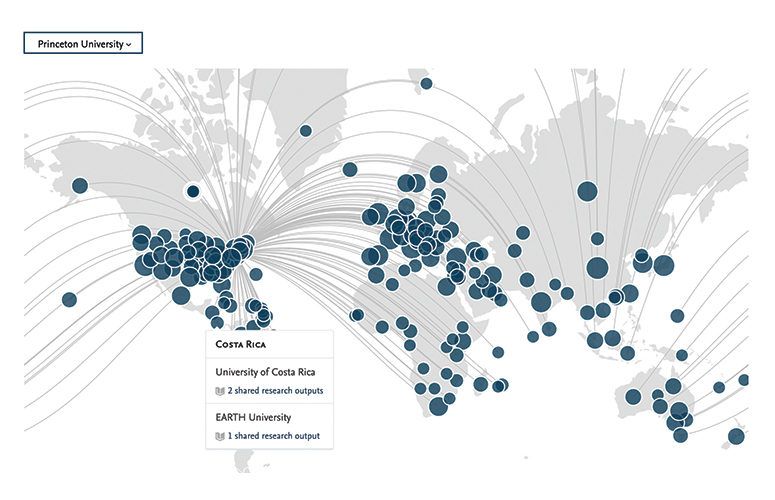
Academic Research Institutions Ask Businesses: ‘How Can We Help You?’
By Anthony Birritteri, Editor-in-Chief On Jun 1, 2016“What do you need?” This is the question New Jersey’s institutions of higher education are asking businesses today. It is a model of collaboration that is seeing ivory tower university research giving way for the practical needs of business innovation. Working together, the partnership between these two worlds is delivering the solutions that are enhancing industry productivity, healthcare, global communications, the environment and our overall quality of life. Just as important, the collaboration is planting the seeds for economic growth in the Garden State.
“New Jersey’s research universities today have designated points of contacts for the business community,” comments Haskell Berman, senior vice president, state affairs for the HealthCare Institute of New Jersey (HINJ) and executive director of the Innovation New Jersey Coalition (INJ). “They are out in the public and meeting with business and industry, asking, ‘How can we help you?’ Years ago, I would get a phone call from a university saying that it had just developed the next great thing for industry, without ever speaking to industry. Now it’s all about the university finding out what businesses want, and then going back to build the solutions.”
“It’s no longer academia holding industry at arm’s length,” concurs S. David Kimball, Ph.D., associate vice president for research commercialization at Rutgers University. “Now, we will go out of our way.” The sole purpose of Kimball’s department, he says, is to expedite interactions with the outside world. “The bureaucracy that people usually think of [in academia] is pretty much gone,” he explains.
What is interesting is that the state’s institutions of higher education are also cross-selling their assets to help businesses. The New Jersey Innovation Institute (NJII), based at the New Jersey Institute of Technology (NJIT) in Newark, is a perfect example. This NJIT corporation helps businesses and their respective technology challenges with not only with NJIT capabilities, but the resources from other institutions. As Judith Sheft, associate vice president, technology development, at NJIT explains, “NJII serves as the front door for companies to access not only NJIT’s capabilities, but those from other institutions, such as Rutgers and Rowan universities. … It’s not just about what we have at NJIT, but what we have in New Jersey to solve business challenges.”
Dr. Shreekanth Mandayam, vice president for research at Rowan University in Glassboro, explains the collaboration reduces duplication, so that the institutions “don’t start building similar capabilities. It’s about making ourselves stronger and not competing with each other, especially for dwindling federal funds.” Because of the lack of federal research funding, Mandayam says that industry and the academic research world must join together to forge strategic directions to entice more grant giving.
At Stevens Institute of Technology in Hoboken, Dr. Gregory P. Prastacos, dean of the institute’s School of Business, says the world is in a renaissance period because of analytics and big data, and the fact that technology is prevalent in every aspect of our professional and personal lives. Because of this, the relationship between business and academia is growing stronger since institutes such as Stevens are “conducting the research that helps businesses understand and exploit these new opportunities.”
Among the many ways Stevens partners with business is the Stevens Alliance for Innovation and Leadership (SAIL). This alliance brings together a broad array of industry partners who learn from Stevens researchers – and each other – in the effort to overcome technology challenges. According to Prastacos, these businesses “are aware of – and value – not only the work we do, but the students we have and whom they hire after they graduate.”
Of the many benefits New Jersey institutions of higher education deliver to high-tech companies throughout the state, perhaps nothing is more important than the skilled workforce than emanates from these institutions.
NJIT’s Sheft comments that people often think of Silicon Valley or Boston’s life sciences corridor as great places to start a high-tech business, “but New Jersey has many resources and advantages for high-tech companies, starting with the students coming from our academic institutions.”
Mandayam adds, “Once industry and universities collaborate, undergraduate and graduate students who work on these projects can be hired and absorbed directly into industry. Businesses are able to grow a talented workforce outside of the company, which can be much better than growing them within.” As an example, he points to the Combat Systems Engineering curriculum that Rowan University, developed with Lockheed Martin. In this program, Rowan students are taught by Lockheed engineers and, upon graduation, have the opportunity to work for the company.
Another added benefit to business/academic partnerships is that fledgling high-tech companies can take advantage of college resources and avoid the risk in investing in the technologies themselves. “R&D costs a lot of money, and industry does not want to make the huge risk investment,” Mandayam explains.
The partnership between business and academia is always evolving, similar to the innovations that stem from these relationships. As NJIT’s Sheft explains, “We are never going to stop and say this model is perfect. We need to be flexible and be able to understand how to adapt so that we can deal with the changing global competitive landscape.
“The notion of open innovation models – in which corporations look to pull capabilities from other companies, academia and small startups – is critically important,” Sheft concludes. “As academic institutions, we have to adapt and see how we can continue to play into the larger innovation ecosystem.”
Related Articles:






